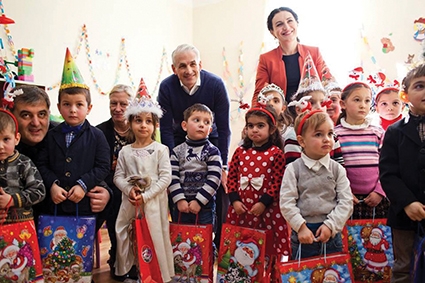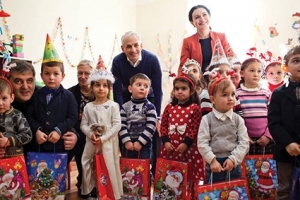Christmas Concert Culminates another Year of Successful Growth at Conflict Divide
The kindergarten in Abano village is comfortable; the building, a village house, is equipped with central heating and a water supply system. It has a playroom, a bedroom and a nice yard with a playground. It looks like a place where children seem genuinely happy, where they can feel warm and safe.
The children who attend the kindergarten come from socially vulnerable families, some of whom don’t even have enough firewood to warm their houses. We were told the kindergarten is the only place where they can receive the food and care they need. We met at least two children who don’t have warm winter clothes to wear, no jumpers, coats or jackets, yet who walk from nearby villages in cold weather every day to come to the kindergarten.
“Many of the local residents in Shida Kartli, including children, are still struggling to overcome the trauma of the 2008 conflict. Our assistance to the region helped thousands of people to see and work towards long-term prospects,” said Simone Wolken, UNHCR Regional representative in the South Caucasus.
Last week the UNHCR and UNDP organized a special New Year concert for the children in Abano kindergarten with the help of teachers and parents. The event saw special gifts given to each child. It was attended by Georgian government officials and UN representatives.
Abano, one of the villages on the conflict divide in the Shida Kartli region of Georgia, has been receiving assistance from the United Nations since 2012. The kindergarten in the village was established in the summer of 2016 with support from UNHCR and UNDP, and serves children from two neighboring villages of Satsikhuri and Koda. It currently provides day-care for approximately 24 children and is the first such establishment in the area in the last 40 years.
The village of Dvani, likewise on the conflict divide, also has a fully rehabilitated kindergarten within the UNHCR/UNDP Shida Kartli assistance program that entails infrastructure and water supply rehabilitation in five villages of Karapila, Saribari, Zadiaantkari, Sakorintlo and Dvani, technical assistance and vocational training for farmers in milk-processing and bee-keeping, consultations, establishment of a milk collection center in the village of Akhalubani to serve three neighboring villages, and a fruit processing plant rehabilitated in Dvani.
The Shida Kartli assistance initiative has been implemented by the United Nations Development program (UNDP) in 2012-2016 with funds from the United Nations High Commissioner for Refugees (UNHCR) and contributions from the European Union and United States Agency for International Development (USAID).The program ran in collaboration with the local authorities and the government of Georgia, with a total budget of USD 1 million.
“It’s with assistance from UNCR that the opening of the kindergarten in Abano village was possible,” said Ketevan Tsikhelashvili, State Minister of Georgia for Reconciliation and Civic Equality. “I would like to confirm that for the next year, support for the population living on the conflict divide will remain a governmental priority.”
“We came with a package of many, many different interventions; we’ve rehabilitated and refurbished two kindergartens, trained over seventy farmers, we’ve established a milk collection facility and fruit processing center, and helped set up water supply systems to assist communities living on the conflict divide to look towards a much brighter future. Today, with the New Year celebration, it’s also a celebration of results which show that, together with the UN, the Georgian government and Shida Kartli municipalities, we can help communities to recover for a better future,” Shombi Sharp, Acting Head of UNDP in Georgia, told GEORGIA TODAY after the concert.
Nino Gugunishvili











